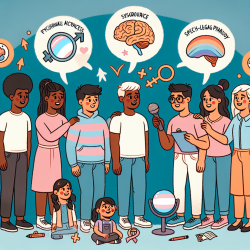As practitioners dedicated to the well-being of children, it is crucial to stay informed about the latest research that can enhance our therapeutic practices. A recent study titled Assessment of Psychological Distress and Peer Relations among Trans Adolescents—An Examination of the Use of Gender Norms and Parent–Child Congruence of the YSR-R/CBCL-R among a Treatment-Seeking Sample offers valuable insights into the mental health challenges faced by trans adolescents and the role of peer relations and parental congruence in these challenges.
According to the study, trans adolescents report significantly higher levels of psychological distress compared to their cisgender peers. This distress is often characterized by internalizing problems such as depression and anxiety. The research highlights several key findings that practitioners can leverage to improve outcomes for trans adolescents:
- Elevated Psychological Distress: Trans adolescents showed significantly higher internalizing and total problems than the German norm population. This underscores the importance of early identification and intervention.
- Poor Peer Relations: The study found a strong correlation between poor peer relations and increased psychological distress. Interventions aimed at improving peer relationships can be crucial in reducing mental health issues.
- Parental Congruence: The congruence between self-reported and parent-reported psychological distress was moderate to high. Greater incongruence was associated with higher levels of distress, indicating that parental awareness and support are vital.
- Gender Norms in Assessment: The study identified significant differences in psychological assessment scores depending on whether male or female gender norms were used. This suggests a need for more nuanced assessment tools that consider the unique experiences of trans adolescents.
Practitioners can take several steps to implement these findings:
- Enhanced Screening: Use comprehensive screening tools that account for both internalizing and externalizing problems. Regular assessments can help in early identification of distress.
- Peer Support Programs: Develop and implement peer support programs to improve social interactions and reduce feelings of isolation among trans adolescents.
- Parental Education: Educate parents about the importance of recognizing and supporting their child's mental health needs. Workshops and counseling sessions can be beneficial.
- Refined Assessment Tools: Advocate for the development of assessment tools that are sensitive to the gender identities of trans adolescents, moving beyond binary gender norms.
Further research is essential to develop more effective interventions and support systems for trans adolescents. Practitioners are encouraged to stay updated with ongoing research and incorporate evidence-based practices into their therapeutic approaches.
To read the original research paper, please follow this link: Assessment of Psychological Distress and Peer Relations among Trans Adolescents—An Examination of the Use of Gender Norms and Parent–Child Congruence of the YSR-R/CBCL-R among a Treatment-Seeking Sample.










